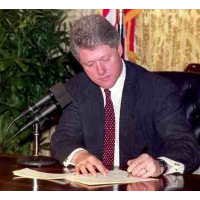8 Policy Decisions Bill Clinton Now Regrets
 President Bill Clinton, 1994 (photo: Getty Images)
President Bill Clinton, 1994 (photo: Getty Images)
It’s not often that a president, after leaving the Oval Office, will own his mistakes. But Bill Clinton has done just that—at least eight times.
During the 15 years since he left the presidency, Clinton has expressed regrets over eight policy decisions he made as the nation’s 42nd Commander in Chief, according to a report by Marina Fang and Amber Ferguson at the Huffington Post.
The eight regrets cover mandatory minimum sentences, deregulation of Wall Street, the war on drugs, banning gay marriage and “Don’t Ask, Don’t Tell,” the Rwandan genocide, Haitian rice tariffs, and HIV/AIDS drug prices.
1. The 1994 Omnibus Crime Bill
On his signing of the 1994 Violent Crime Control and Law Enforcement Act that included mandatory minimum sentences, even for minor offenses such as drug crimes and a federal “three strikes” provision, Clinton recently said: “I signed a bill that made the problem worse, and I want to admit it.”
“Some are in prison who shouldn't be, others are in for too long, and without a plan to educate, train, and reintegrate them into our communities, we all suffer,” he added.
2. The Commodity Futures Modernization Act
Clinton passed policies that made it easier for banks to practice predatory lending and give risky mortgages to low-income homebuyers, according to the Post. He signed the repeal of the Glass-Steagall Act (pdf), a law that had been in place since 1933 which separated commercial and investment banking. He also signed the Commodity Futures Modernization Act, which prevented derivatives from being regulated.
“All of these policies eventually wrecked [sic] havoc on the global economy in the form of the 2007-08 financial crisis,” wrote Fang and Ferguson.
Clinton has said he regretted the decision on derivatives, noting that he shouldn’t have taken the advice of his economic advisers. “On derivatives, yeah, I think they were wrong, and I think I was wrong to take [their advice],” he said. “Now, I think if I had tried to regulate them, because the Republicans were the majority in the Congress, they would have stopped it. But I wish I should have been caught trying. I mean, that was a mistake I made.”
3. The War on Drugs
On the issue of drug smuggling, he escalated federal efforts to stem the drug trade, which only shifted it across the border.
“I wish you had no narco-trafficking, but it’s not really your fault,” Clinton told Mexico during a speaking engagement there. “Basically, we did too good of a job of taking the transportation out of the air and water, and so we ran it over land. I apologize for that.”
4. Defense of Marriage Act
When the U.S. Supreme Court heard arguments in the case to overturn the Defense of Marriage Act (pdf) in 2013, Clinton urged the court to rule against it, admitting he had erred in signing it into law in 1996.
5. Don’t Ask, Don’t Tell
Clinton similarly confessed that he regretted the “Don’t Ask, Don’t Tell” policy—allowing gays and lesbians to serve in the military provided they didn’t reveal their sexual orientation—which he instituted in 1994. “But keep in mind, I didn’t choose this policy,” he pointed out in 2010. “The reason I accepted it was because I thought it was better than an absolute ban”—which the House of Representatives had voted for at the time.
6. Rwanda Genocide
One of Clinton’s most profound regrets seems to be his failure to have the U.S. intervene in the 1994 Rwanda genocide. “The United States just blew it in Rwanda,” he said during a 2006 visit to the country. “If we'd gone in sooner, I believe we could have saved at least a third of the lives that were lost,” he told CNBC in 2013. “It had an enduring impact on me.”
7. Haitian Rice Tariffs
Haiti’s economy was hit hard by the damage done to its country’s rice farmers after Clinton called for an elimination of tariffs on imported, subsidized U.S. rice. Calling his decision “a devil’s bargain” in 2010, Clinton sat before a U.S. Senate committee and conceded “it was a mistake that I was a party to. I am not pointing the finger at anybody. I did that. I have to live every day with the consequences of the lost capacity to produce a rice crop in Haiti to feed those people, because of what I did. Nobody else.”
“That’s how it’s done. It’s all there…” wrote Matthew Pulver at Salon. “Clinton admitting that powerful corporate agricultural interests were given favor at the expense of poor people; Clinton admitting that free trade orthodoxy ruins poor nations and enriches the wealthy. And not only did he apologize, but Clinton admitted fundamental failures of that economic model.”
8. Drug Patents
The Clinton administration actively supported trade policies that solidified and extended pharmaceutical patents, which had the effect of increasing drug prices around the world, putting them out of reach for many patients. “It was wrong,” Clinton later said of his administration’s fight to strengthen drug patents.
-Danny Biederman, Noel Brinkerhoff
To Learn More:
Bill Clinton Is Sorry For A Lot Of Things (by Marina Fang and Amber Ferguson, Huffington Post)
Bill & Hillary’s Hyper-Capitalist Disaster: How The Clintons Can Apologize For A Decade Of Deadly Policies (by Matthew Pulver, Salon)
10-Year Anniversary of the Bill That Led to the Current Economic Crisis (by Noel Brinkerhoff and David Wallechinsky, AllGov)
- Top Stories
- Unusual News
- Where is the Money Going?
- Controversies
- U.S. and the World
- Appointments and Resignations
- Latest News
- Musk and Trump Fire Members of Congress
- Trump Calls for Violent Street Demonstrations Against Himself
- Trump Changes Name of Republican Party
- The 2024 Election By the Numbers
- Bashar al-Assad—The Fall of a Rabid AntiSemite






Comments